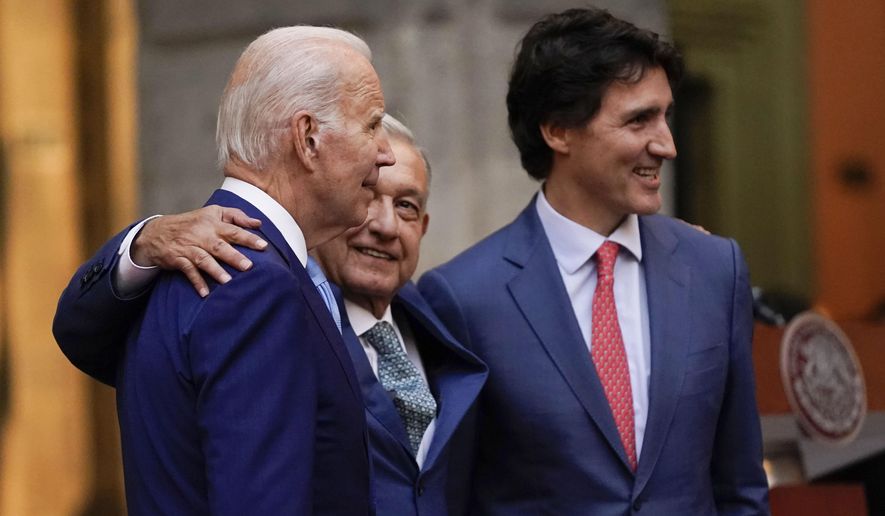President Biden on Tuesday outlined a wide-ranging list of agreements reached between the U.S., Canada and Mexico aimed at promoting economic competitiveness, advancing clean energy initiatives, and combating the surge of migration and drug trafficking at the U.S. southern border as the three leaders capped this year’s North America Leaders’ summit.
After two days of sometimes contentious talks, the three leaders pledged unity in tackling the growing list of challenges facing the region.
“We cannot wall ourselves off from shared problems,” Mr. Biden said during a press conference capping the summit. “We are stronger and better when we work together.”
Despite the wide-ranging agenda, immigration remained front and center as the leaders described their progress Tuesday.
Just before the visit, Mr. Biden unveiled his strategy to deal with the flood of migration.
His plan calls for a new pathway to the U.S. for up to 30,000 migrants a month from Venezuela, Cuba, Haiti and Nicaragua, while increasing enforcement mechanisms to deter those who seek to enter the country illegally.
Mr. Biden kicked off his trip to Mexico with a stop along the U.S. southern border, his first as president despite overseeing two years of an unprecedented migration crisis.
On Tuesday, Mr. Biden blamed Republicans for failing to come to the table sooner to stem the tide of migration.
“This has been the greatest migration in human history around the world, as well as in this hemisphere,” he said. “And when I got elected, the first major piece of legislation I introduced was to reform the immigration process to make it more orderly.”
“The point here is that my Republican friends in Congress should join us in the solutions,” he said.
As part of the policy, Mexico has agreed to take on 30,000 migrants per month who are turned away at the U.S. border.
In addition, the three leaders outlined during the summit that they will build on the Los Angeles Declaration announced in June to streamline access to legal migration pathways and announced coordination initiatives to crack down on arms and drug trafficking throughout North America.
Other commitments reached during the summit are aimed at promoting North American economic competitiveness, advancing clean energy and climate change initiatives.
Among the initiatives is a trilateral forum aimed at coordinating investment in semiconductor manufacturing and supply chains across North America on the heels of Mr. Biden signing the $280 billion Chips and Science Act, which includes more than $50 billion to boost domestic chip manufacturing.
Mr. Biden has faced blowback from some of the U.S.’ closest allies in recent months over measures meant to boost U.S. competitiveness including Democrats’ marquee $740 billion climate- and spending bill, which includes generous tax credits for U.S.-manufactured electric vehicles.
European leaders say the measure threatens to cripple their manufacturing as automakers move operations across the Atlantic to capitalize on the incentives, sucking away jobs and investment money as the bloc braces for economic headwinds.
Canada has expressed similar concerns.
Coordination on the semiconductor front will let the three countries identify “complementary investment opportunities,” according to the White House.
The three leaders also agreed on several climate-related initiatives including a joint commitment to reduce methane emissions from solid waste and wastewater by 15% from 2020 levels by 2030.
The leaders also agreed to develop a plan to expand electric vehicle charging stations along their borders, among other clean energy and climate change initiatives.
Mr. Biden kicked off the two-day summit with a notably tense sit-down with Mexican President Andres Manuel Lopez Obrador who accused the U.S. of turning a blind eye to its neighbors to the south.
“This is the moment for us to determine to do away with this abandonment, this disdain, and this forgetfulness for Latin America and the Caribbean,” the Mexican president said.
He added: “President Biden, you hold the key in your hand to open and to substantially improve the relationship among all the countries of the American continent.”
Mr. Biden noted in his remarks that the U.S., in the last 15 years, spent “tens of billions of dollars in the hemisphere.”
“Unfortunately, our responsibility just doesn’t end in the Western Hemisphere,” he said. “It’s in Central Europe. It’s in Asia. It’s in the Middle East. It’s in Africa. It’s in Southwest Asia.”
The back-and-forth reflected the strained relationship between the two leaders on full display in June when Mr. Lopez Obrador skipped the Summit of the Americas in Los Angeles over Mr. Biden’s decision not to invite leaders from Cuba, Venezuela and Nicaragua.
Mr. Biden’s bilateral exchange with Canadian Prime Minister Justin Trudeau stood in stark contrast to his meeting with his Mexican counterpart.
In his brief remarks to the press ahead of the meeting, Mr. Biden showcased his optimism for the future and the strong U.S.-Canadian alliance.
Mr. Biden shared similar optimism for the trilateral relationship in his concluding remarks.
“We’re true partners, the three of us, working together with mutual respect, and genuine like for one another, to advance a safer and more prosperous future for all of our people,” he said. “The reason why this summit, this trilateral relationship, is so impactful is because we share a common vision of the future, grounded on common values.”
• Joseph Clark can be reached at jclark@washingtontimes.com.




Please read our comment policy before commenting.